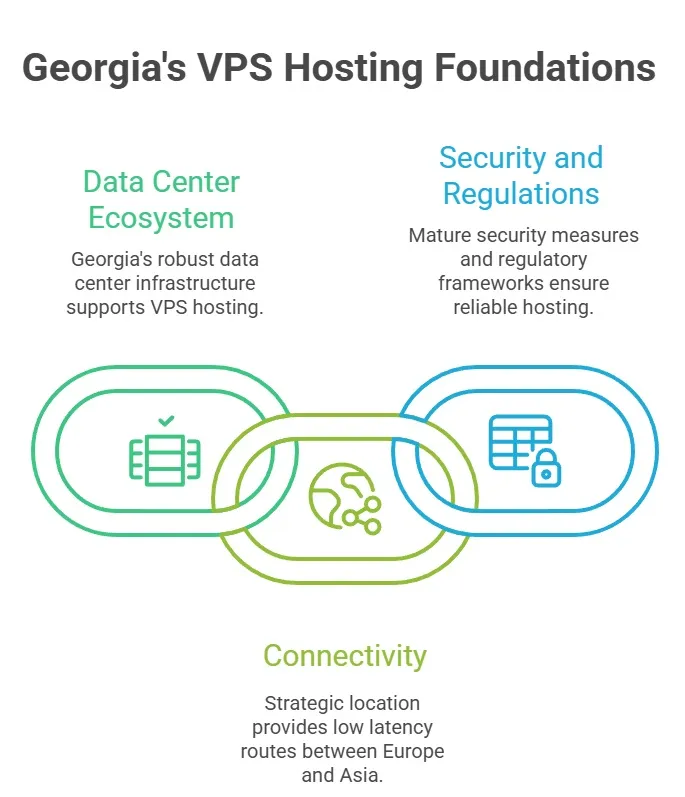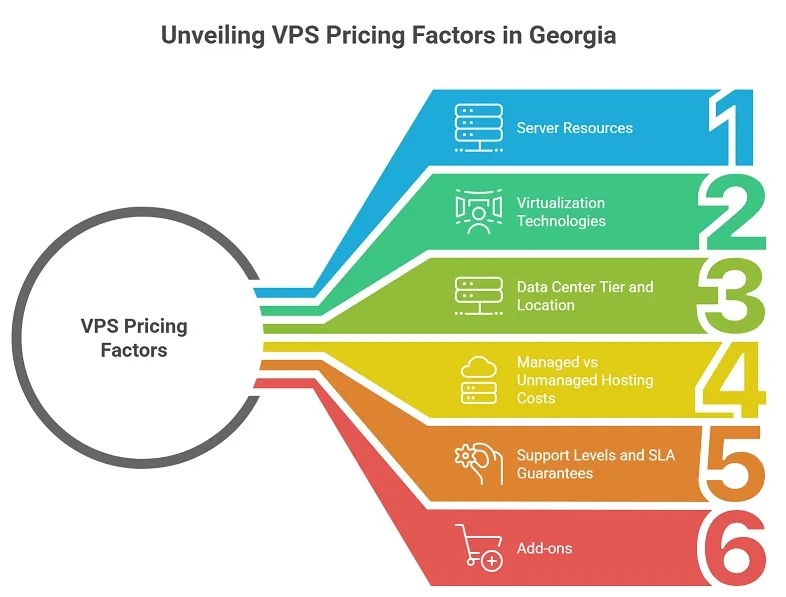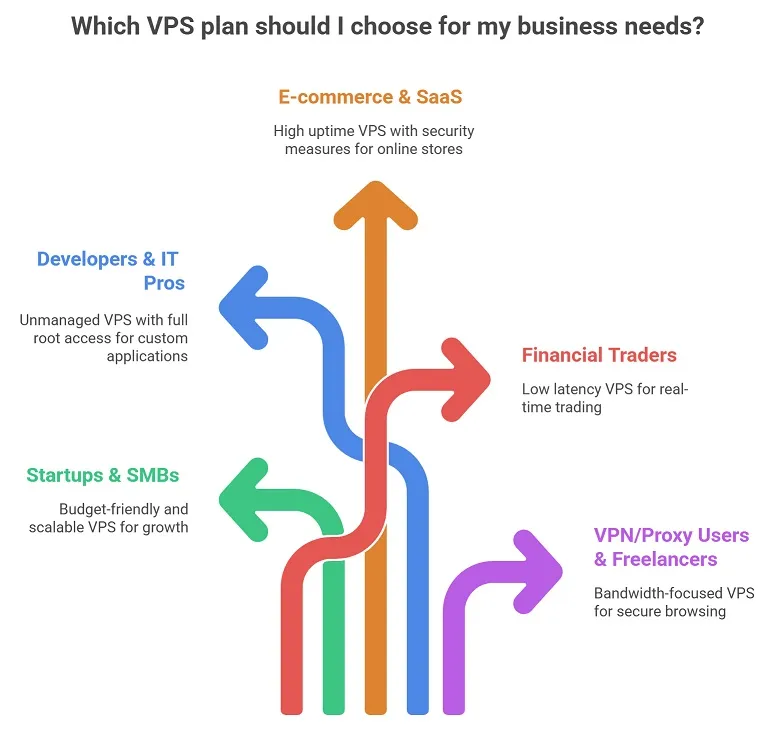Understanding VPS pricing in Georgia is crucial for businesses looking to balance cost and performance. With a range of plans tailored to different needs, from small startups to large enterprises, choosing the right VPS can directly impact operational efficiency, website performance, and overall IT expenses. Georgia’s competitive pricing offers companies the opportunity to access high, quality hosting infrastructure at lower costs compared to many Western European providers, making it an important consideration for strategic budgeting and growth.
The VPS Hosting Landscape in Georgia
Georgia’s Data Center Ecosystem
Georgia has developed a network of modern Tier III data centers, primarily concentrated in Tbilisi with some facilities in regional hubs. These centers feature redundant power supplies and climate control systems, with infrastructure quality varying by provider. Several providers follow international standards, such as those from the Uptime Institute. Businesses should review provider certifications, SLA uptime guarantees, and technical specifications when hosting critical applications to ensure reliability. Overall, this ecosystem demonstrates Georgia’s efforts to strengthen its role as a reliable digital hub in the Caucasus region.
Europe Asia Bridge and Low Latency Routes
Thanks to its strategic geography, Georgia serves as a digital crossroads connecting Europe and Asia. Fiber‑optic backbones, diverse international transit providers, and regional Internet Exchange Points (IXPs) reduce latency and improve redundancy. Businesses hosting in Georgia benefit from faster access to key markets like Frankfurt, Amsterdam, Istanbul, and Dubai, making it especially valuable for financial trading, content delivery networks, and SaaS platforms where milliseconds matter.
Security, Regulations, and Infrastructure Maturity
Georgia has implemented a personal data protection law that has similarities with the European Union’s GDPR framework, and measures have been taken to enhance cybersecurity. Its legal environment encourages IT investments and hosting operations, enhancing trust for local and international clients. Coupled with stable electricity, advanced fiber optic networks, and mature enterprise grade infrastructure, Georgian data centers provide resilient, scalable, and secure VPS hosting. Businesses can confidently deploy applications knowing compliance, uptime, and network reliability are prioritized. (CCDCOE)
Key Factors That Influence VPS Pricing in Georgia
Server Resources
CPU cores, RAM size, storage type (SSD, NVMe), bandwidth allocation, and disk IOPS are critical factors that determine VPS performance. Evaluating these resources with your business workload in mind ensures efficient application hosting, smooth website operation, and reliable database management. Consider anticipated traffic, concurrent users, and future scalability when choosing the appropriate VPS configuration to avoid performance bottlenecks.
Virtualization Technologies
Options like KVM, OpenVZ, and VMware determine how VPS resources are allocated and isolated. KVM offers full virtualization with strong performance and security, suitable for applications requiring root access and custom kernel modules. OpenVZ provides lightweight container based virtualization, ideal for smaller workloads and cost effective deployments. VMware is an enterprise grade hypervisor often used in large scale business environments with high availability and resource management features. Understanding these technologies helps businesses select a VPS that matches performance, scalability, and security requirements.
Data Center Tier and Location
Georgia offers a mix of Tier III data centers, predominantly in Tbilisi, with additional facilities in regional hubs. Choosing a data center tier affects uptime guarantees, cooling and power redundancy, and network reliability. Tbilisi based centers typically provide higher connectivity options and easier access to international fiber backbones, while regional options may offer cost advantages. Evaluating location alongside tier ensures businesses balance performance, latency, and budget effectively when selecting a VPS.
Managed vs Unmanaged Hosting Costs
Choosing between managed and unmanaged VPS plans affects both budget and operational control. Managed VPS includes provider support for server maintenance, security updates, and monitoring, which can save businesses time and reduce technical risks but may cost more upfront. Unmanaged VPS gives full root access and flexibility to configure software and optimizations independently, ideal for IT professionals and developers who want complete control and cost efficiency. Evaluating your team’s expertise, required support level, and long term scalability will help determine the best option for your business.
Support Levels and SLA Guarantees
VPS providers in Georgia typically offer 24/7 technical support through multiple channels, including live chat, email, and phone. Service Level Agreements (SLAs) define uptime guarantees, response times, and issue resolution protocols. Understanding these support commitments helps businesses ensure minimal downtime, fast troubleshooting, and reliable continuity for critical operations. Providers with proactive monitoring and dedicated account management often deliver higher reliability, making SLA evaluation a key factor in plan selection.
Add-ons
Additional VPS features such as DDoS protection, control panels like cPanel or Plesk, automated backups, dedicated IP addresses, SSL certificates, and firewall management enhance security, ease of use, and reliability. Choosing the right combination of add-ons allows businesses to tailor their VPS environment to specific workloads, compliance requirements, and operational needs, providing both performance optimization and peace of mind.
Review and Comparison of VPS Prices in Georgia
VPS Price Ranges
VPS in Georgia is usually offered in plans with different prices and features. These ranges help businesses compare options realistically and match VPS resources to their operational requirements, ensuring they choose a plan that best fits their needs. Typical VPS Price Ranges in Georgia usually include the following categories:
- generally start around $10–$20 per month for small websites,
- $20–$40 for growing businesses,
- and $40–$50+ for enterprise level needs with enhanced resources and support.
These pricing tiers provide a cost effective alternative to many Western European providers, allowing businesses to balance performance and budget efficiently.
Comparison of Georgia VPS Pricing vs EU Hubs (Germany, Netherlands, UK)
Georgia generally offers cost effective VPS plans compared to many Western European providers, though exact savings vary depending on configuration and provider. While EU providers may offer additional compliance features or advanced datacenter options, Georgian VPS providers can deliver competitive uptime and connectivity, providing businesses with a balance of performance and affordability.
Price Performance Advantage
Georgian VPS hosting offers a strong balance of affordability, reliable uptime, low latency connectivity, and scalable resources. Selecting a VPS in Georgia can provide performance comparable to some Western European providers while potentially reducing costs, depending on the provider and plan chosen. This makes Georgia a viable option for startups, SMBs, SaaS platforms, and international businesses seeking a balance between performance and affordability.
How to Choose the Right VPS Plan for Your Business
The following plans can be suggested based on the usage of the virtual server:
-
- Startups & SMBs: budget friendly, scalable VPS designed for growth, with flexible CPU, RAM, and storage options that can adapt as business needs increase, ensuring performance, reliability, and cost efficiency.
- Developers & IT Pros: unmanaged VPS with full root access and configurable environments, ideal for deploying custom applications, running development stacks, and optimizing performance according to specific project requirements, providing complete control over server resources and security settings.
- E-commerce & SaaS: High uptime VPS plans include security measures such as firewall management, automated backups, and compliance with relevant regulations. Providers’ specific implementations and performance guarantees should be verified to ensure they meet the requirements of online stores, SaaS applications, and customer facing platforms.
- Financial traders: low latency, high performance VPS optimized for real time trading platforms, algorithmic trading, and market data feeds, with redundancy and fast connectivity to major financial exchanges for minimal latency and maximum reliability.
- VPN/Proxy users & freelancers: bandwidth focused VPS with high speed connectivity, reliable throughput, multiple IP support, and optimized routing for secure browsing, remote work, and proxy server operations.
Hidden Costs and Pricing Traps to Watch Out For
Understanding VPS pricing requires looking beyond advertised rates to avoid unexpected expenses. Recognizing these hidden costs upfront helps businesses make informed decisions, budget accurately, and select a VPS provider that aligns with both performance needs and financial expectations:
- Extra charges can arise for individual IP addresses, automated backup solutions, and server migration services, especially from popular providers like AWS, Google Cloud, or DigitalOcean. Users should evaluate whether these costs are billed per instance, per month, or per data transfer, and check for bundled packages or free tiers to avoid unexpected expenses. Including these fees in the budgeting process ensures transparent cost management and prevents billing surprises.
- Understanding the differences between first term promotional discounts and standard renewal pricing is crucial. Many VPS providers, including Linode, Vultr, and Hostinger, offer significant introductory rates that can be 30-70% lower than the regular monthly cost. Users should carefully review the terms to anticipate future billing, consider multi year commitments for potential savings, and compare renewal costs against competitor offerings to ensure long term affordability and prevent budget surprises.
- Bandwidth limitations versus “fair use” policies, including data transfer caps, throttling thresholds, and peak usage restrictions, which can impact site performance and server responsiveness. Users should check providers like AWS, DigitalOcean, or Hetzner for clear documentation on monthly traffic limits, overage fees, and network prioritization rules. Understanding these policies helps prevent unexpected slowdowns, additional charges, and ensures a VPS plan meets the needs of high traffic applications, streaming services, or e-commerce platforms.
- Opaque billing practices that hide extra fees or complex charges, such as unexpected taxes, setup costs, or tiered service fees. Users should examine detailed invoices, understand billing cycles, and review provider terms on platforms like AWS, Google Cloud, or Bluehost. Transparency in pricing allows for better financial planning, avoids sudden cost spikes, and helps users select a VPS provider with trustworthy and clear billing practices.
Future Proofing Your VPS Investment
As businesses increasingly rely on virtual private servers (VPS) to power their digital operations, selecting a hosting provider that offers scalability, cutting edge infrastructure, and aligns with emerging trends is crucial. This section delves into key considerations for future proofing your VPS investment, with a focus on Georgia’s evolving hosting landscape.
Importance of Scalability: Vertical and Horizontal Expansion
Scalability is paramount for businesses anticipating growth or fluctuating workloads. Vertical scalability allows for upgrading existing server resources (CPU, RAM, storage), while horizontal scalability involves adding more servers to distribute the load. Providers offering both options enable seamless adaptation to changing demands. In Georgia, VPS providers are increasingly offering flexible plans that cater to both vertical and horizontal scaling needs.
Choosing Providers with Next Gen Infrastructure
- High speed uplinks, such as 10Gbps connections, can improve performance and reduce latency for data intensive applications. While some Georgian VPS providers offer these capabilities, availability varies by provider, so businesses should confirm network specifications with their chosen host.
-
NVMe Storage: Non Volatile Memory Express (NVMe) storage provides faster data access speeds compared to traditional SSDs, enhancing application performance. Many Georgia based VPS providers are incorporating NVMe storage into their offerings to meet the demands of modern applications.
Emerging Trends in VPS Hosting
-
Cryptocurrency Payments: With the rise of digital currencies, some VPS providers now allow you to buy VPS with crypto, offering greater flexibility for international clients.
-
Green Hosting: Sustainability is becoming a priority, with hosting providers adopting eco friendly practices, such as utilizing renewable energy sources to power data centers. This trend is gaining traction in Georgia as well, with providers focusing on reducing their carbon footprint.
- Edge Locations: Deploying servers closer to end users reduces latency and improves performance. Georgia’s strategic location between Europe and Asia positions it as a potential hub for edge computing, attracting businesses seeking optimized connectivity.
Georgia’s VPS hosting market is experiencing significant growth, driven by advancements in infrastructure and favorable regulatory developments. The introduction of regulations for Virtual Asset Service Providers (VASPs) by the National Bank of Georgia in 2023 underscores the country’s commitment to creating a secure and compliant digital environment.
By considering these factors and staying informed about industry trends, businesses can make strategic decisions to ensure their VPS investments remain robust and adaptable in the face of technological advancements and market shifts.
FAQ
1. What factors influence VPS pricing in Georgia?
VPS pricing in Georgia depends on several factors, including server resources (CPU, RAM, storage), bandwidth, data center location, and management level. Providers also differentiate costs based on whether you choose unmanaged or fully managed plans. Businesses seeking reliable performance often opt for premium VPS in Georgia with SSD storage and high-speed uplinks. Comparing features alongside pricing ensures you get the right balance of cost efficiency and performance for your specific needs.
2. Why should businesses consider VPS in Georgia instead of shared hosting?
Unlike shared hosting, a Georgia VPS offers dedicated resources, improved security, and greater scalability. This makes it ideal for businesses running high-traffic websites, e-commerce stores, or applications that demand consistent performance. While VPS pricing is slightly higher than shared hosting, the long-term value lies in reliability, uptime, and customization options. For companies in Georgia or targeting regional markets, a VPS ensures faster connectivity and reduced latency compared to shared hosting solutions.
3. How does VPS Georgia compare to international VPS providers?
Choosing VPS Georgia often provides lower latency for local users, better compliance with regional regulations, and cost advantages due to local infrastructure. While international providers may offer more global coverage, a VPS located in Georgia delivers stronger performance for businesses operating in or targeting the Georgian market. By combining affordability with reliable resources, a Georgia VPS can compete effectively with larger global hosting brands, especially for businesses needing local presence.
4. Is VPS in Georgia suitable for startups and small businesses?
Yes, VPS in Georgia is an excellent option for startups and SMBs. It offers a cost-effective middle ground between shared hosting and dedicated servers. Startups benefit from scalability—being able to upgrade CPU, RAM, or storage as traffic grows—without facing major downtime. With competitive VPS pricing in Georgia, businesses can launch with minimal investment while still enjoying security, dedicated resources, and better performance than shared hosting. This makes it a smart choice for growth-focused companies.
5. What is the typical cost range for VPS Georgia plans?
The cost of VPS Georgia plans typically ranges from budget-friendly entry-level options to premium high-performance servers. Basic plans may start with limited resources suitable for small websites, while advanced packages with high RAM, multi-core CPUs, and large SSD storage can be priced higher. Factors like managed support and bandwidth also affect cost. By evaluating business needs against pricing tiers, companies can find a Georgia VPS solution that delivers both affordability and performance.
6. How can businesses maximize value from their Georgia VPS investment?
To get the most from your Georgia VPS, businesses should choose a plan aligned with their workload, monitor resource usage, and scale as demand grows. Opting for SSD storage and sufficient bandwidth enhances website speed and uptime, while regular updates and security monitoring protect against vulnerabilities. Selecting a reputable provider with transparent VPS pricing in Georgia ensures no hidden costs. With the right setup, a Georgia VPS becomes a powerful, scalable hosting foundation for long-term growth.



